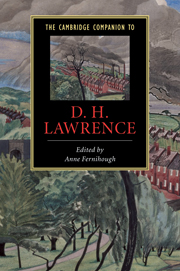Introduction
Published online by Cambridge University Press: 28 May 2006
Summary
This volume opens and ends with puzzlement: at the start of chapter 1, Rick Rylance reflects on the puzzlement of Lawrence's earliest reviewers as they struggled to ascertain the literary and social provenance of his work: was 'D. H. Lawrence' a man or a woman, what was his or her social background, and to what literary tradition did these strange fictions belong? Chris Baldick closes the last chapter with puzzlement as to what the readers of the new century will make of a writer whose reputation, both literary and personal, has undergone extraordinary vicissitudes, fluctuating more wildly than that of any other twentieth-century British author. There seems to be hardly anyone else who has generated such extreme reactions in his readers, from people at one end of the spectrum who have tried to 'become' Lawrence to people who have felt contaminated by reading him. That reading and writing about Lawrence can be a bewildering and often problematic enterprise is a fact that all the contributors to this book touch on in different ways. For Rick Rylance, Lawrence's early work disturbs and unsettles its readers because it is itself wrestling with the 'chronically disturbed' relations between mind and body in an age where materialist scientific theories have denied any divine agency in the natural world. For Marianna Torgovnick in chapter 2, Lawrence pushes his critics into starkly polarised positions: either they ritualistically rehearse his views or they reject him out of hand. The problem, she argues, is how to negotiate between these extremes. For Hugh Stevens in chapter 3, attempts to interpret a work like Women in Love in political terms can all too easily 'lead to a banality which is absolutely at odds with the novel's power'. And so the problems posed by Lawrence's work proliferate from chapter to chapter.
- Type
- Chapter
- Information
- The Cambridge Companion to D. H. Lawrence , pp. 1 - 12Publisher: Cambridge University PressPrint publication year: 2001



